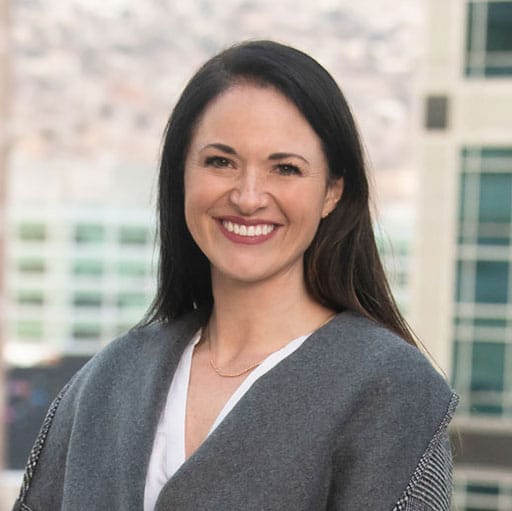Predicting exactly how much growth to expect (or strive for) in your business can be tricky to forecast. This week we look to Amy Cook, CMO of Simplus, Amy has grown, scaled, and been a part of many merging teams throughout her career. Their growth has been rapid and expansive, which definitely required great leadership.
“Simplus was doing a few million and had just barely done a series A. [We had] a growth rate of over 300% year-over-year. I attribute so much of that to our CEO who really empowered each team member on the executive team to do the very best that they could. And then he kept it all together with his vision and focus on culture. It was really an amazing opportunity; since then [in] the past 18 months we’ve been acquired by Infosys. That has been another humongous learning curve to learn how to be part of a massive organization of 250,000 people.”
Regardless of the size of the team or the title on your email signature, Amy is all about finding the best marketing solutions to her questions. Her success in marketing can be attributed to her openness and collaboration. In this episode of Marketing Trends, Amy dives into, scaling and growing a marketing business to enterprise size, and as a part of that keeping the marketing part of the business integrated with the whole organization. Prepare to benefit from Amy’s optimistic and collaborative attitude about growth and best marketing team practices up next on Marketing Trends.
Main Takeaways
- Scaling Well and Growing to Enterprise Size: Focus on culture when merging two companies; the larger the company, the more important being able to integrate both teams becomes. Keeping a strong line of communication to the whole organization about the mission and vision is critical to help everyone work together more effectively. Looking around to see what other companies of the same size are doing can be helpful. Replicating the best methods and practices you see in their organizations is a big time-saver.
- Agencies Can Help if you’re Struggling with Retention: If you lose someone on your team, or can’t scale the team as quickly as you need, agencies are a solution to your problem. It’s still best to keep the heart of the marketing department in-house, but farming out smaller portions of the marketing mix that can be executed by an agency can help you address bandwidth issues on your team.
- Marketing as an Integral Part of the Whole Organization: It’s important to stay closely connected with the rest of the company in the marketing department. Alignment across departments spans more than just sales and marketing. Siloing yourself off in a bubble will keep you from valuable insights that the rest of the team could impart. Building relationships at every level internally and externally can help you reach more customers with a message that solves their problems.
Key Quotes
“Simplus was doing a few million and had just barely done a series A. [We had] a growth rate of over 300% year over year. I attribute so much of that to our CEO who really empowered each team member on the executive team to do the very best that they could. And then he kept altogether with his vision and focus on culture. It was really an amazing opportunity; since then [in] the past 18 months we’ve been acquired by Infosys. That has been another humongous learning curve to learn how to be part of a massive organization of 250,000 people.”
“ [Agencies] work really well if you’re having trouble retaining people, then an agency can give you that unlimited support. You can fire your agency at any time if they’re not performing well for you with no consequences. At the agency, we go by the hour. And so there’s a hundred percent utilization out of your team. So if the price is low enough and the utilization is a hundred percent, there’s a really good case to fill in some of those gaps
“When marketing [takes on] more of an ancillary role, then you lose a lot of the positivity that you can have from marketing. I have finance meetings with the team each week.. Not only do you have to connect internally [with teams], but you also need to connect with your partners with your customers and do joint co-marketing with your partners to reach the same customers. It’s a whole lot of relationship-building, even more than I would have expected when I just started doing marketing deliverables all those years ago.”
“I know that I’m only going to get event ROI if I empower sales leaders to lead the event. And [sales] knows that [they’re] only going to get marketing support if those salespeople [are] accountable for the event. So there’s a really great understanding of each other.”
“Every sales leader is a little bit different and you have to be adaptable. Marketing has to take a support role, aligned behind the sales leader, and say, ‘I’ll use your playbook. What does your playbook look like?’”
“I approach marketing [believing] everybody’s got good ideas; the delivery team’s got amazing ideas; our legal department gives us great marketing ideas; we can all flow together and collect our marketing knowledge.”
“As you [grow] more into the enterprise you can see what other lines of business are doing. For us, a 30% growth rate is now what we’re achieving, or what we’re desiring to achieve because the account sizes are so much larger. So when you’re a little company, you can expect an insane growth rate. And then when you’re in an enterprise your growth rates are going to be more like 30%. When you’re forecasting, [do] some underwriting on what other companies like you were doing and setting your goal, maybe 10% higher, so you can crush your competition.”
Bio
Amy Osmond Cook, Ph.D., is the Chief Marketing Officer of Simplus, an Infosys Company. At Simplus, she led the marketing efforts from Series A through acquisition, helping the company achieve a 3-year growth rate of 1,578% and acquire seven companies before being acquired by Infosys for $250M. Amy is also the founder of Osmond Marketing, which has been named one of the fastest-growing businesses in Utah by MountainWest Capital for five years in a row. She is an adjunct faculty member at BYU-Hawaii and has taught business and communication courses at BYU, University of Utah, and ASU intermittently for the past 25 years. Amy is a columnist for the Daily Herald and a regular contributor to Forbes, the Orange County Register, and other publications. She received her doctorate from the University of Utah in Organizational Communication, and her research interests, informed by Critical Theory, include organizational identification, communication ethics, and gender dynamics in the workplace.
—
Marketing Trends podcast is brought to you by Salesforce. Discover marketing built on the world’s number one CRM: Salesforce. Put your customer at the center of every interaction. Automate engagement with each customer. And build your marketing strategy around the entire customer journey. Salesforce. We bring marketing and engagement together. Learn more at salesforce.com/marketing.




